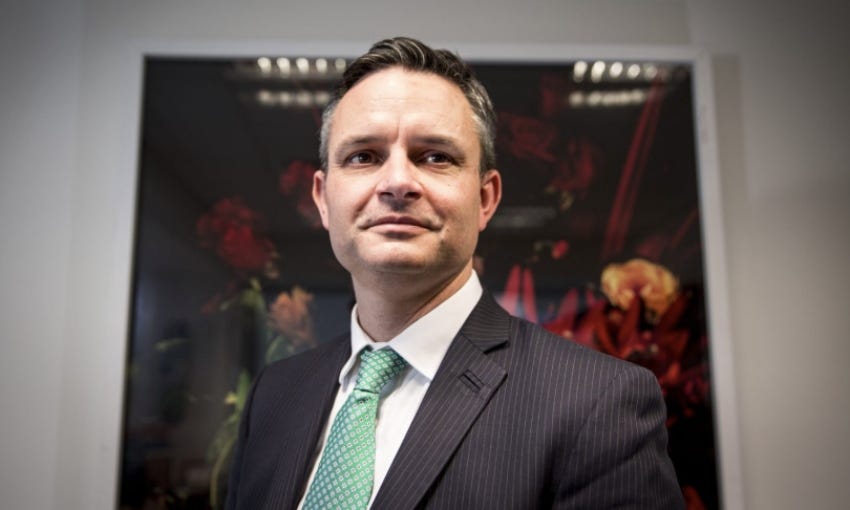The Bulletin: Zero Carbon bill passes, with so far still to go
Good morning and welcome to The Bulletin for Friday 8 November, by Alex Braae for The Spinoff. Presented in partnership with Z Energy

In today’s edition: Government passes flagship climate change legislation, former minister Anne Tolley admits Peters disclosure, and changes coming at Oranga Tamariki

Image: Climate change minister and Zero Carbon bill shepherd James Shaw (Radio NZ, Rebekah Parsons-King)
The Zero Carbon bill, one of the most difficult pieces of legislation of this government's term, has finally passed a third reading. It came in more than a year later than when it was intended to be delivered, has fallen short of what many environmental campaigners were hoping for, and was very ugly to watch at times.
That should not diminish the fact that it is a huge stride forward for the government, and climate change minister James Shaw in particular. His whole term has been building up to this. It is something of a vindication of his many compromises as a minister, and to basically stake his career on getting this bill passed, preferably and ultimately successfully with the support of National. Interest reports National will now go into the election with a series of amendments, that they failed to get through as Supplementary Order Papers before the third reading. Activist group Generation Zero, who first set this piece of legislation in motion, urged the need for parties to continue to work together.
The top lines of the bill are as follows: The government is now committed to emissions reductions that will limit warming to 1.5C. To do that, budgets will be set for emissions, along with targets for reducing specific gases. A Climate Change Commission will be established, and will advise the government on how to get there.
PM Jacinda Ardern and Leader of the Opposition Simon Bridges both took a call to speak. Between them, there was a clear division over whether the methane budget should be a call for the climate change commissioner to make. It is now basically certain to be a contested area in the election. Having said that, because National agreed in the end to vote for the legislation, it could become less of a culture war and more of a haggle over details, at least among the major parties.
Among the other speakers, Kiritapu Allan delivered a powerful message to rural New Zealand. From 2.40 onwards in her speech she outlined how her East Coast community had suffered from climate change, and other food producing areas. Todd Muller, now National's agriculture spokesperson but previously a significant reason the bill got over the line, offered strong praise for James Shaw, former MP Kennedy Graham, and some of his colleagues. Judith Collins promised to get to work on it after the election. David Parker thought that was bitter. Overall, the tone was one of ambition to get on with tackling climate change, as can be read in these extended transcriptions of some of the speeches.
Will the new set of laws actually work for that? It still largely depends on politics, and a government intent on flouting the new rules would probably be able to ride out the political consequences. The carbon budgets that now need to be set aren't legally binding, which is a major weakness of the bill – others of which are set out in this Law Talk article from August. As the bill was the product of compromise, it also sets weaker targets than what many were hoping for. The point was made by Forest and Bird's Kevin Hague, that passing the law was just the first step. "Now we need concrete, urgent, climate action to save our most vulnerable native species and restore native ecosystems.”
Into the future, the government will continue to come under heavy pressure from activist groups. Oil Free Wellington gave one example, in criticising the government for congratulating itself on passing the bill, while the just-released minerals and petroleum strategy continues to allow fossil fuel exploration. The strategy does discuss phasing out exploration at length, but makes it clear the decision to allow onshore exploration in Taranaki to continue won't be changed, as part of the transition period.
Many similar decisions will come up, and governments will be tested frequently, as they work out how actually lowering emissions can be delivered. It's also clear the pressure will stay on from many directions. Farmers and other sector groups will continue to argue that they shouldn't have more costs imposed on them. Federated Farmers in particular have pushed at the idea that the bill will contravene the 2015 Paris Agreement, specifically passages around food production being protected.
Finally, and speaking personally, I want to thank Parliament TV for their hosting of videos linked to in today's Bulletin. It's invaluable to have this resource for our democracy, available to any member of the public, and I encourage you to watch others. On climate change, the most important issue of their time, this is what our politicians had to say at the final stage of this bill. Now we can all hold them to their ambitious words.
Former cabinet minister Anne Tolley has admitted discussing confidential information about Winston Peters' superannuation overpayment. However, the NZ Herald reports Tolley has denied being the source of the leak to media. She discussed it with her senior advisor in confidence, who then told other staffers in the office, as well as mentioning it in passing to her sister. She said she sincerely regretted the "outburst" that led to the latter disclosure.
Oranga Tamariki has announced it will be making major changes in their practices around taking newborns, reports Alice Webb-Liddall for The Spinoff. These come out of the internal review into OT, as opposed to the external reviews conducted by figures like Children's Commissioner Andrew Becroft. The review has also found that the uplift incident that sparked it all – powerfully documented by Newsroom – was "unacceptable", and that disputed “historical information” was relied on too much in making the decision to take the baby.
Xero is close to turning their first annual profit, amid another large growth in subscriber numbers, reports Stuff. The accounting software company reported a $1.3 million profit for the six months to the end of September, which follows a similar figure for the last six months of the last financial year. They now have more than 2 million users on the books, with Britain accounting for a large share of the latest surge. The company is now valued at almost $10 billion Australian dollars on the ASX.
A high profile Antarctica study has been cancelled by the University of Canterbury, and a top scientist has been let go suddenly, reports Thomas Mead for One News. When questioned about why, UC said it related to a "complex employment matter", which had now been resolved. The study would have played into government efforts to defend a marine protected area around the Ross Sea, and local Antarctica watchers say it was a significant one.
Kiwirail is reassuring Greymouth that they still intend to bring the TranzAlpine train back to the town, reports the Greymouth Star's Brendon McMahon (via the ODT) For the last five weeks the tourist train has been stopping in Arthur's Pass, with buses taking passengers the rest of the way, because of a major slip at Omoto. As a result, fewer tourists are coming through Greymouth, which is causing a downturn for retailers.
This story is rather dense and quite complicated, but get through that and it gives a fascinating picture of NZ's place in the international financial services industry. Gareth Vaughan at Interest has reported on FXBTG Financial Limited, a company which has just failed in a bid to have their NZ deregistration overturned. Why? Because they had just one local employee, and according to the judge only had that to try and claim the reputational benefits of being registered in New Zealand.
Justin Lester's hopes for a successful recount have been dented by new information from the electoral officer, reports Stuff. They say that contrary to previous understandings, if invalid results were to be considered, the number falling to Lester wouldn't be enough to overturn the deficit with Wellington mayor Andy Foster. Lester is still pushing ahead for a hand recount, and it remains to be seen if that will be granted.
Meanwhile in further local government news, the code of conduct investigation into former Christchurch councillor Deon Swiggs has been dropped. The Press reports it is basically because he isn't a councillor any more, though Swiggs has insisted that he'll still try and clear his name. Swiggs lost his seat after being accused of sending "grossly inappropriate" messages to young people, which he denies.
Got some feedback about The Bulletin, or anything in the news? Drop us a line at thebulletin@thespinoff.co.nz

Right now on The Spinoff: Gaurav Sharma writes about the effects that minister Shane Jones' words have on the Indian NZer community. Alice Webb-Liddall writes about the all-time high rates of antidepressant prescription, and why they aren't necessarily bad. Alice Webb-Liddall again writes about Te Huka Mātauraka, a home away from home for Dunedin’s Māori students. I have a cheat sheet about PCE Simon Upton's latest report, into the poor state of environmental data collection. Simon Pound speaks to Victoria Carter, founder of cheap car-share service CityHop. And the TV section has a whole lot of updates about what TVNZ will screen in 2020, including the news that Art Green will host The Bachelorette.
For a feature today, an interesting look into a publication which was able to go worldwide after finding their niche. North and South's Sarah Lang has profiled the White Fungus art publication, which began as a zine and now has an international edition produced from Taiwan. We'll pick up the story with this excerpt from the interview with founder Ron Hanson, who founded the publication with his brother over outrage at the proposed inner-city bypass through Wellington.
"Mark and I wanted to make a one-off publication to create a historical record of the area being destroyed. We profiled artists and art collectives, did a story on the history of Cuba St, and another story on the planned bypass. We designed it on an old computer, used our parents’ photocopier until it broke down, then snuck into our dad’s office at night to photocopy more copies.
Friends helped us staple, fold and gift-wrap about 1000 copies, then we went around town throwing them over fences or hurling them through doors. When something is wrapped in Christmas paper, you open it. Then we got an anonymous donation of $200 to print more copies. It was meant to be a one-off publication, but it stimulated so much interest."
Women's hockey has been bolstered ahead of next year's Olympics by the return of two retired stars. Newsroom's Sarah Cowley Ross spoke to Kayla Whitelock, a veteran of four Olympic games, about her decision to come back – basically, she just couldn't turn down the chance to have one last go at getting an elusive medal. Gemma McCaw has also come out of retirement, and between them the pair have 501 international caps. Of course, they'll both still have to make the grade to be in the Black Sticks, and are playing in the National Hockey League at the moment to prove they've still got it.
Finally, from an organisation point of view, NZ Rugby is about to go through a really difficult and interesting transition. The Spinoff's Duncan Greive has analysed what is facing them, particularly with the financial power of rugby becoming ever more concentrated in the northern hemisphere. It makes you wonder – will the All Blacks ever have as good a chance to win the Rugby World Cup ever again?
That's it for The Bulletin. If you want to support the work we do at The Spinoff, please check out our membership programme.




